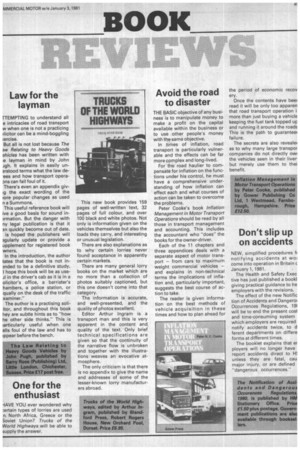Law for the layman
Page 47

If you've noticed an error in this article please click here to report it so we can fix it.
[TEMPTING to understand all e intricacies of road transport w when one is not a practicing )licitor can be a mind-boggling cercise.
But all is not lost because The 3W Relating to Heavy Goods ehicles has been written with R layman in mind by John ugh. It explains in easily un3rstood terms what the law de
• ees and how transport operaans can fail foul of it.
There's even an appendix givog the exact wording of the lore popular changes as used n a Summons.
This useful reference book will ive a good basis for sound inirmation. But the danger with ny legal publication is that it 3n quickly become out of date. is hoped the publishers will gularly update or provide a upplernent for registered book wners.
In the introduction, the author tates that the book is not in?.nded to be a definitive study. I hope this book will be as useJI in the driver's cab as it is in a olicitor's office, a barrister's hambers, a police station, or qually on the desk of the traffic xaminer."
The author is a practising soliitor, and throughout this book hey are subtle hints as to "how he other side thinks." This is iarticularly useful when one ails foul of the law and has to ippear before the bench.
One for the enthusiast
-IAVE YOU ever wondered why ]ertain types of lorries are used n North Africa, Greece or the Soviet Union? Trucks of the World Highways will be able to supply the answer. This new book provides 159 pages of well-written text, 32 pages of full colour, and over 100 black and white photos. Not only is information given on the vehicles themselves but also the loads they carry, and interesting or unusual legislation.
There are also explanations as to why certain lorries never found acceptance in apparently certain markets.
There are many general lorry hooks on the market which are no more than a collection of photos suitably captioned, but this one doesn't come into that category.
The information is accurate, and well-presented, and the quality of photos excellent.
Editor Arthur Ingram is a transport man and this is very apparent in the content and quality of the text. Only brief technical specifications are given so that the continuity of the narrative flow is unbroken and together with the illustrations weaves an evocative atmosphere.
The only criticism is that there is no appendix to give the name and addresses of some of the lesser-known lorry manufacturers abroad.
Avoid the road to disaster
THE BASIC objective of any business is to manipulate money to make a profit on the capital available within the business or to use other people's money with the same objective.
In times of inflation, road transport is particularly vulnerable and the effects can be far more complex and long-lived.
For the road haulier to compensate for inflation on the functions under his control, he must have a comprehensive understanding of how inflation can effect each and what courses of action can be taken to overcome the problems.
Peter Cooke's book Inflation Management in Motor Transport Operations should be read by all those in transport management and accounting. This includes the accountant who "does" the books for the owner-driver.
Each of the 11 chapters and three appendices deals with a separate aspect of motor transport — from cars to maximum weight commercial vehicles — and explains in non-technical terms the implications of inflation and, particularly important, suggests the best course of action to take.
The reader is given information on the best methods of vehicle acquisition in these times and how to plan ahead for the period of economic recov ery.
Once the contents have beet read it will be only too apparen that road transport operation i more than just buying a vehicle keeping the fuel tank topped up and running it around the roads This is the path to guarantee( failure.
The secrets are also revealet as to why many large transpor companies do not directly owl the vehicles seen in their liver but merely use them to thei benefit.
Don't slip up on accidents
NEW, simplified procedures f( notifying accidents at woi come into operation in Britain c January 1,1981.
The Health and Safety Exec tive has just published a bookl giving practical guidance to he employers with the revisions.
The effect of the new Notific tion of Accidents and Danger(); Occurrences Regulations, 191 will be to end the present cost and time-consuming system which employers are required notify accidents twice, to d ferent departments on differe forms at different times.
The booklet explains that er players will no longer have report accidents direct to Elt unless they are fatal, cau major injury, or are defined "dangerous occurrences."












































































